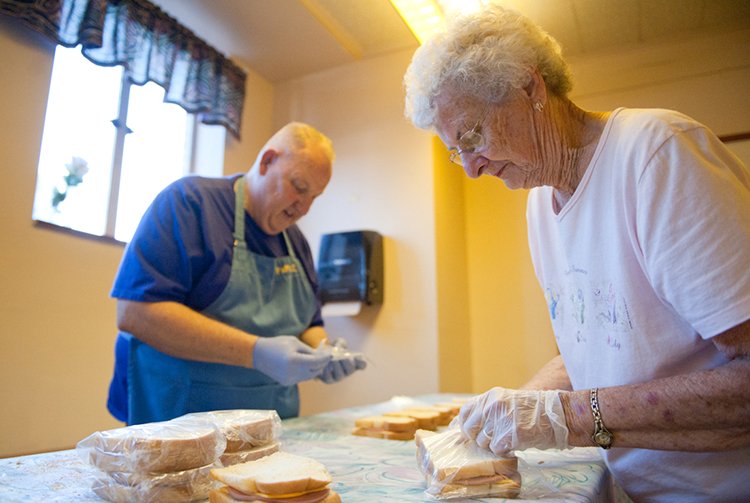
Larry Lesser, a member of Sacred Heart Parish in Topeka, and Mary Kirk, a member of Mater Dei Parish in Topeka, prepare the day’s sandwiches. The ministry typically hands out more than 100 sandwiches a day.
Topeka’s sandwich ministry has been quietly transforming the capital city for more than 50 years
by Katie Hyde
katie.hyde.theleaven@gmail.com
Feeding the poor and hungry of Topeka takes 34,290 sandwiches a year, to be exact.
Luckily, the staff and volunteers of the Sandwich Ministry are up to the task.
Rain or shine, the Sandwich Ministry’s window opens every weekday at 8 a.m. sharp. And rain or shine, the hungry show up for a meal — for some, it is the only meal they will eat that day.
Though they seek neither praise nor attention for their good deeds, the Sandwich Ministry has been quietly transforming Topeka for over 50 years — one filling bite at a time.
A look at Topeka poverty
Topeka is one of the archdiocese’s poorest cities. Poverty rates are close to 20 percent, well over the national poverty average. In fact, all of Shawnee County has been hit especially hard by the economic recession; poverty rose five percent from 2000 to 2010.
The volunteers and staff at the Sandwich Ministry have witnessed this dramatic increase. Ten years ago, they agree, there was opportunity for Topeka’s poorest to rise out of poverty.
But with the economic recession of the 2000s disproportionately affecting the poorest, it seems the dream of rising from poverty is dying.
“There already is a [permanent class of people who cannot rise out of poverty],” said Sister Marjorie Cushing, SCL, a staff member at the Sandwich Ministry. “The number of people who come here has increased in unbelievable numbers since I started here.”
Sister Marjorie started working at the Sandwich Ministry three years ago following the death of long-time staff member and social justice advocate Sister Mary Corita Conlan, SCL.
Many of the 24,000 people living in poverty in Topeka do not know where their next meal is coming from. This is especially true for the people and families who show up at the Sandwich Ministry’s window for a meal.
The face of hunger
There are a lot of regulars at the Sandwich Ministry’s window each day.
There’s Ferguson, the man who disappears for months at a time, then shows up and explains he was “in school,” though all the volunteers know he was actually in jail.
There’s the woman who has never given her name, but who has been coming for over 30 years. She first showed up when she was young, and now that she’s older, she often brings her children and grandchildren for a bite.
And then there’s Peter, the one-eyed regular who is so courteous he is a favorite with all the staff.
And they keep coming back.
Though the lunch is just a simple, dry, white bread sandwich with bologna and American cheese, two cookies, and a bag of chips, they don’t complain.
In fact, most people who have relied on the Sandwich Ministry during difficult times are enormously thankful for the help.
The face of help
After working for over 30 years at the Sandwich Ministry, Jean Smith has endless compassion for the thousands who arrive at the window for a meal.
According to her, many people who come are unemployed or underemployed.
“Some do work, but just can’t make it to the end of the month,” she said. “It can be a big thing when they find work. It thrills me when they do.”
Like the man who Smith affectionately calls “pop-can guy.” For years, he has been collecting aluminum cans to recycle for money.
One morning in June, he arrived for a meal and told Smith that he had a job interview. Then he asked for her prayers.
He came back the next day to tell Smith he got the job.
Though these stories give Smith and the other volunteers hope and motivation, for every customer that finds a job, there are many who are unemployed, hungry, and homeless.
And those who can’t find work or homes are often ostracized from the city’s other antipoverty programs.
“We work for the people who are under bridges and by the river,” said Sister Marjorie. “They are the people no one else senses, because a lot of the other organizations in Topeka don’t let them in.”
Further compounding the troubles of Topeka’s poor is that people do not fully understand the struggles of those in poverty.
“I don’t think people fully grasp how widespread poverty is,” Sister Marjorie added. “They’re not bums. They’re hardworking people down on their luck. They would do anything not to be where they are.”
Many of them just don’t know how to begin.






